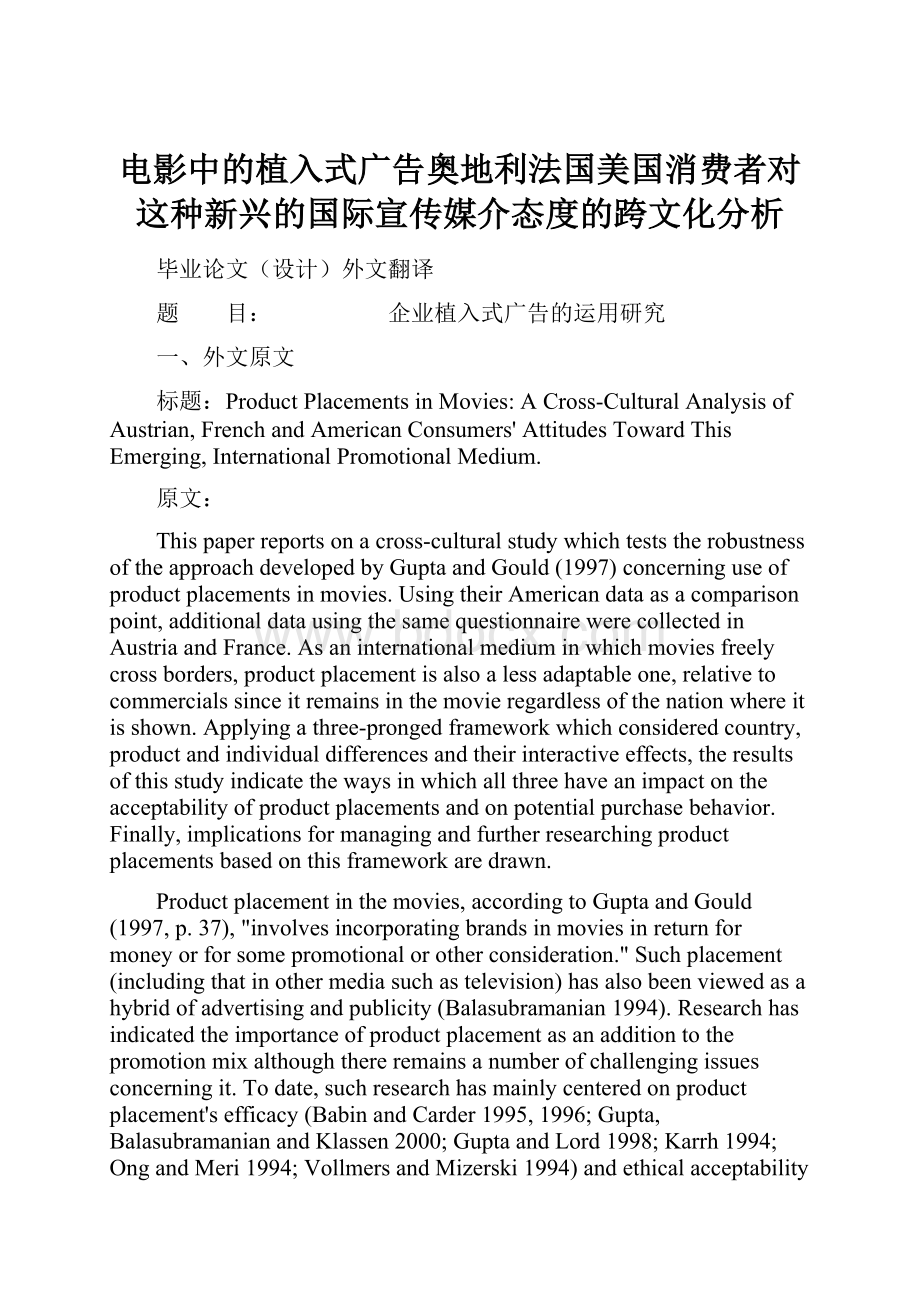电影中的植入式广告奥地利法国美国消费者对这种新兴的国际宣传媒介态度的跨文化分析.docx
《电影中的植入式广告奥地利法国美国消费者对这种新兴的国际宣传媒介态度的跨文化分析.docx》由会员分享,可在线阅读,更多相关《电影中的植入式广告奥地利法国美国消费者对这种新兴的国际宣传媒介态度的跨文化分析.docx(10页珍藏版)》请在冰豆网上搜索。

电影中的植入式广告奥地利法国美国消费者对这种新兴的国际宣传媒介态度的跨文化分析
毕业论文(设计)外文翻译
题 目:
企业植入式广告的运用研究
一、外文原文
标题:
ProductPlacementsinMovies:
ACross-CulturalAnalysisofAustrian,FrenchandAmericanConsumers'AttitudesTowardThisEmerging,InternationalPromotionalMedium.
原文:
Thispaperreportsonacross-culturalstudywhichteststherobustnessoftheapproachdevelopedbyGuptaandGould(1997)concerninguseofproductplacementsinmovies.UsingtheirAmericandataasacomparisonpoint,additionaldatausingthesamequestionnairewerecollectedinAustriaandFrance.Asaninternationalmediuminwhichmoviesfreelycrossborders,productplacementisalsoalessadaptableone,relativetocommercialssinceitremainsinthemovieregardlessofthenationwhereitisshown.Applyingathree-prongedframeworkwhichconsideredcountry,productandindividualdifferencesandtheirinteractiveeffects,theresultsofthisstudyindicatethewaysinwhichallthreehaveanimpactontheacceptabilityofproductplacementsandonpotentialpurchasebehavior.Finally,implicationsformanagingandfurtherresearchingproductplacementsbasedonthisframeworkaredrawn.
Productplacementinthemovies,accordingtoGuptaandGould(1997,p.37),"involvesincorporatingbrandsinmoviesinreturnformoneyorforsomepromotionalorotherconsideration."Suchplacement(includingthatinothermediasuchastelevision)hasalsobeenviewedasahybridofadvertisingandpublicity(Balasubramanian1994).Researchhasindicatedtheimportanceofproductplacementasanadditiontothepromotionmixalthoughthereremainsanumberofchallengingissuesconcerningit.Todate,suchresearchhasmainlycenteredonproductplacement'sefficacy(BabinandCarder1995,1996;Gupta,BalasubramanianandKlassen2000;GuptaandLord1998;Karrh1994;OngandMeri1994;VollmersandMizerski1994)andethicalacceptability(GuptaandGould1997;NebenzahlandSecunda1993).Areviewofthesestudiesindicatesamajorgapintheliterature:
thepreviousstudiesofproductplacementwereconductedintheU.S.,andtherehasbeenlittlefocusonitasaglobalphenomenon.However,thegeneralglobalizationofmarketingcommunications,theinterestinintegratingtheminIntegratedandGloballyIntegratedMarketingCommunicationsprograms(DeLorme1998;GreinandGould1996),andthefactthatmanymoviesplaytoandoftenareproducedformultinationalaudiencesraisetheissueofhowconsumersinothercountriesperceiveproductplacements.
Consideringproductplacementonacross-nationalorculturalbasisisimportantfromamarketingpointofviewintermsoftheissueofstandardizationversusadaptation.(Itshouldbenotedthatcross-nationalmeansacrossnationswhilecross-culturalmayimplyotherdistinctionsaswell,sinceculturesoftendonotfollownationalboundaries[cf.DawarandParker1994]).Here,bothtermsmaybeused,butingeneralthestudytobereportedwillbeonacross-nationalbasis.)Whileitisnotverylikelythatamoviewouldhavemultipleinternationalversionsbasedondifferentversionsofproductplacement,amarketercouldnonethelessmakeadecisionastohowagloballymarketedproductwouldplayinallthecountrieswherethemoviemightbedistributed.Fromthispointofview,theproductplacementcampaignisoneofstandardizationbydefault.Still,asKarrh(1998a)pointsout,thereareverylikelytobecross-culturaldifferenceswithrespecttoattitudestowardproductplacementwhichshouldbeconsidered.However,amarketercannotcreatelocalproductplacementsinaglobalmovieaseasilyaslocalcommercials.Thus,althoughmanyAmericanmoviesarewidelyexported,theirproductplacementsusuallyarenotculturallyadapted.Therefore,theresultisgenerallyeitherstandardizationornothing.Reflectingthisconcernandtheinflexibilityofproductplacementsrelativetosomeotherformsofpromotion,thispapertakesafirststepinaddressingtheresearchgapintheinternationalliteraturebyinvestigatingcross-nationalperceptionsoftheefficacyandacceptabilityofproductplacements.ThisstudywillalsoexploretherobustnessoftheGuptaandGould(1997)approachtoproductplacementsinotherenvironments.
ACross-CulturalFramework
Ingeneral,cultureingeneralinformsproductmeaningslargelythroughthepromotionalsystem,andthesemeaningsinturnareengagedandacteduponbytheconsumer(McCracken1986).Thisapproachmaybeextendedbothcross-culturally(Gould1998)andtoproductplacement(Russell1998).Theseideassuggestthataproduct'splacementinamoviemayvaryintheeffectsithasindifferentcountries.However,beyondthegeneralideaofculturewhenconsideredincross-nationalorcross-culturaltermsistheissueofculturalversusindividualdifferencesasoutlinedbyDawarandParker(1994).Advertisersinthisregardmustmakedecisionsaboutsegmentationbaseduponwhethertherearecross-nationaldifferencesand/ortherearewithin-nationdifferenceswhichtranscendnationalboundaries.Forexample,considerwhetherAmericanandFrenchconsumersdifferfromeachotherintheirattitudestowardproductplacementand/orwhethermenandwomeninbothcountriesdifferfromeachotherinsimilarways(e.g.,AmericanscouldhavemorefavorableattitudestowardproductplacementthanFrenchconsumers,whilesimilarpatternsofmale-femaledifferencesalsocoexistforbothnationalities).Ifattitudestowardproductplacementvarybynationality,thiswouldindicatetheoreticallythatproductmeaningsdifferacrosscountriesandthatthoseusingproductplacementmustemployverydifferentstrategiesthanwheretheattitudesandmeaningsaresimilar.
Ontheotherhand,individualdifferencesbasedonfactorsotherthannationalculturemayalsoplayaroleinconsumerresponsetoproductplacement.InDawarandParker's(1994)terms,thesemayberegardedasnon-culturalvariableswhich,ifimproperlyconsidered,mightbeconfoundedwithculturalvariables.Intheproductplacementarea,GuptaandGould(1997),forinstance,consideredanumberofvariablesofthistype,includingattitudestowardproductplacement;frequencyofviewingmovies,andgender.Whiletheseindividualvariablesmaycertainlybeinfluencedbyorinteractwithculture,theireffectmayormaynotvaryonacross-nationalorcross-culturalbasis.Thus,aswithotherconsumerphenomena,responsetoproductplacementshouldbeinvestigatedintermsofbothcross-nationalandindividualdifferencevariables.Ifcross-nationaldifferencespredominate,thenthekeysegmentationvariableforproductplacementwouldbecountryorethnicity.Undersuchconditions,standardizationstrategieswouldnotwork.However,ifindividualdifferencespredominate,thenthesevariableswillserveasthekeytargeting-segmentationvariables.Standardizationstrategieswouldbemorefeasibleandtheywouldaimatmulti-local,regionalorevenglobalsegments.Ifbothtypesofvariables(i.e.,cross-nationalandindividualdifferences)arefoundtohaveaneffectonresponsetoproductplacementorifaninteractionbetweenthesetypesexists,thenmorecomplex,adaptationalstrategieswouldberequired.AllthesepossibleeffectswillalsoreflectontherobustnessoftheGuptaandGould(1997)approachintermsofvariablesappliedandlinked.
Astillmoreintricateperspectiveblendsinproducteffects.Wang(1996)providesacontingencyapproachforglobalstrategydevelopmentwhichconcernsthreevariables:
country,productandconsumersegment(individualdifferences).Wang'sapproachsuggeststhatvariousinteractionsbetweenanyorallofthesethreewouldinvolveamodificationofstandardizationstrategies.Forinstance,aproductwithconsumersegmentinteractionwouldmeanthatdifferentstrategiesmustbedevelopedforeachsegment,andthatproductsmayappealtocertainsegmentsacrosscountries,butnotothers.Acountrywithconsumersegmentinteraction,ontheotherhand,indicatesthataparticularproductappealstomanysegmentsbutthatresponsepatternsvarywithinthem(e.g.,heavyusersresponddifferentlyacrosscountries).Aproductwithcountryinteractionsuggeststhatwithincountrydifferencesarenotamajorfactorwhilecross-countrydifferencesare.Athree-wayinteractionwouldleadtotheformationofnichestrategies.
Onthebasisoftheforegoing,therearethreegeneralhypotheseswhichmaybeusedtoconstructaframeworkforproductplacementeffects:
thecross-nationaldifferencehypothesis,theproductdifferencehypothesis,andtheindividualdifferencehypothesis.Here,theproductdifferencehypothesisisexaminedbothintermsofwithin-categoryandbranddifferences(e.g.,withinthecameracategory)andbetweenproductcategorydifferences(e.g.,cameraversusalcohol).Iftherearenocross-nationaldifferences,productand/orindividualdifferences,suchasthosefoundbyGuptaandGould(1997)intheU.S.,shouldbesimilaracrosscountries.However,iftherearecross-countrydifferences(e.g.,thecross-nationaldifferencehypothesis),thenitisverylikelythatsomeinteractionswillbefound.
ProductPlacementsinMovies
Inconsideringhowproductplacementsfunction,DeLormeandcolleagues(DeLorme,ReidandZimmer1994;DeLormeandReid1999)foundthatconsumersconnectedtheworldofthefilm,includingproductplacements,withtheirsocialworld,aswellasconsumption-specificaspectsoftheirowneverydaylife.Russell(1998)theorizesthattransformationalandaffecttransferprocessesareatworkintheestablishmentoflinkagesbetweenamovieortelevisionshowandtheproductplaced.Thesefindingsoflinkagescouldbeimportantforbuyingbehaviorsincethedecisiontopurchaseaproduct